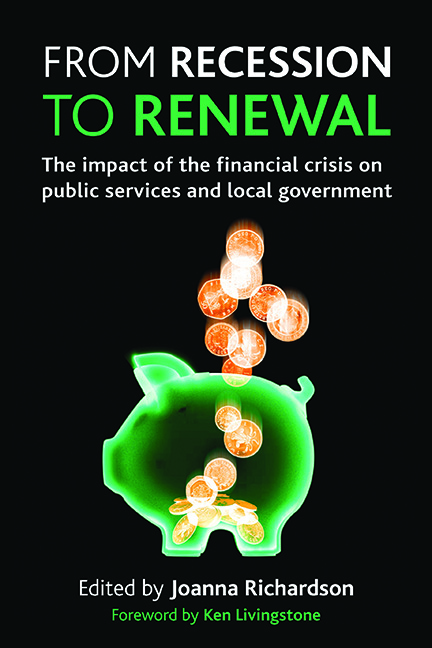 From Recession to Renewal
From Recession to Renewal four - Public policy responses to fiscal debt or deficit: is there a difference?
Published online by Cambridge University Press: 01 September 2022
Summary
After the government rescue package for the UK banking sector in 2008–09 the government's fiscal deficit rose substantially and quickly to over 12% pa and there was a consensus that there needed to be an adjustment to reduce the fiscal deficit and the total government debt of the UK. However, there was no consensus over the timing of the reduction, the depth of that reduction or the actions that should be taken to achieve it; as Hunter (2009) pointed out, ‘it is not whether the belt gets tightened, but which notch it gets pulled to’. This chapter examines some of the issues behind the arguments about how to view the fiscal deficit and how to respond. The UK election in May 2010 did little to resolve the issues long term, but clarified the position in the short term. The Conservative and Liberal Democratic parties had differing policies in their election manifestos but the coalition government confirmed its intention to adopt the Conservative policy of immediate savings (£6 billion). The political and economic dimensions need to be addressed separately. While these two aspects are usually linked and seen as part of the same problem, in the UK the economic models being used were not called into question, but rather, how to interpret and deal with the factors as applied to those models. This, to a large extent, is part of the consequence of the globalisation of financial markets and hence acceptance of (or more importantly the need to accept) global financial monitoring by the big international financial institutions such as the International Monetary Fund (IMF), World Bank and European Central Bank.
The underlying assumptions
The underlying debate on actions is based on the assumptions of economic models such as those put forward by the IMF, for example, the Mundell-Flemming and Polak models. The workings of the model are not of concern in themselves as they were not questioned by any of the political parties. What is of importance is the assumptions upon which they are based and the consequences of various actions. This chapter is therefore going to take a ‘black box’ approach to discussing only the input and output elements of the models (for details see Pilbeam, 2006).
- Type
- Chapter
- Information
- From Recession to RenewalThe Impact of the Financial Crisis on Public Services and Local Government, pp. 73 - 88Publisher: Bristol University PressPrint publication year: 2010
